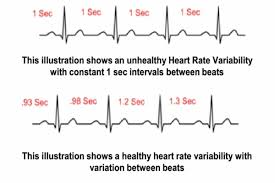Many people with Chronic Fatigue conditions like CFS/ME, mold toxicity and long covid are turning towards technology, like Heart Rate Variability, to help them better manage their health, their nervous systems and support their recoveries.
Heart Rate Variability (HRV) is a biological marker that you measure using a watch or an app on your smartphone linked to a wearable device. If you can understand HRV, you potentially have valuable insight into the state of your autonomic nervous system and day to day fluctuating levels of resilience and capacity.
What is Heart Rate Variability?
Heart Rate Variability (HRV) refers to the variation of time between each heart beat. The heart does not beat like a metronome with equal timing, instead some heart beats are closer together and some are further apart. For example, if your heart beats at 60 beats per second, this might mean some beats happen every 0.8 seconds, some at 1.2 seconds, some every 0.9 seconds, but the average is every second, which equals 60 beats per minute.
HRV occurs due to the dynamic interplay of the sympathetic and parasympathetic branches of the autonomic nervous system (ANS) regulating the heart rate. Therefore, the ability to monitor HRV, gives insight into the balance of these two branches of the nervous system.
More variability between each beat is indicative of higher parasympathetic tone in the nervous system. Less variability, a more steady heartbeat, is indicative of higher sympathetic tone in the nervous system and the activation of greater fight or flight responses (which results in chronic fatigue).
Using Heart Rate Variability in Chronic Fatigue
Given the popularity of understanding the nervous system in the context of chronic illness, many people make use of HRV technology to gain insight into the state of their nervous system so that they can support and guide their systems away from too much sympathetic tone and towards more restful and restorative parasympathetic tone.
Autonomic Nervous System (ANS) Dysregulation
Chronic fatigue often involves dysregulation of the autonomic nervous system (ANS), with an imbalance between the sympathetic (fight-or-flight) and parasympathetic (rest and digest) branches. HRV reflects this balance, and monitoring it can provide insights into ANS activity. In CFS, individuals may exhibit lower HRV, suggesting a dominance of sympathetic activity, which may contribute to fatigue.
Stress Assessment
Chronic stress is a common factor in chronic fatigue. HRV can serve as a non-invasive and objective marker of stress levels. Individuals experiencing chronic fatigue often have altered stress responses, and HRV monitoring can identify periods of heightened stress. By recognizing these patterns, individuals can implement stress management techniques to improve overall well-being and increase HRV.
Exercise Prescription
Physical activity is an important aspect of managing chronic fatigue, but it’s crucial to find the right balance. HRV can help tailor exercise programs by indicating the body’s readiness for physical exertion. Monitoring HRV can guide individuals in choosing appropriate exercise intensity and volume, preventing overtraining and fatigue exacerbation.
Sleep Quality
Sleep disturbances are common in chronic fatigue. HRV can be used to assess sleep quality, as disruptions in the sleep-wake cycle can impact autonomic balance. Monitoring HRV during different sleep stages can provide insights into sleep habits.
Biofeedback and Relaxation Techniques
HRV biofeedback involves training individuals to regulate their ANS activity consciously. This can be particularly powerful for individuals in need of modulating their physiological responses. Techniques such as deep breathing and meditation may help restore balance to the autonomic nervous system.
Early Warning Signs
Changes in HRV patterns may serve as early warning signs of exacerbation of fatigue or other symptoms associated with chronic fatigue. Regular HRV monitoring can enable individuals to identify patterns and make adjustments accordingly.
Measuring HRV
There are a variety of devices on the market that measure Heart Rate Variability (HRV) as well as manual techniques. A few well-known devices include:
Apple Watch
Garmin Watch*
Oura Ring*
Heart Rate Variability (HRV) is typically measured in milliseconds (ms) or as the time between successive heartbeats.
How to Improve HRVMost people with Chronic Fatigue are seeking to improve their HRV as a marker of increased parasympathetic tone and improved resilience in the autonomic nervous system. A few ways to improve include:
Sleep
Exercise
Nutrition
Mental and Emotional Stress
Physical stress such as infections, toxins, blood sugar imbalances, alcohol, smoking and caffeine.
Certain supplements may have a temporary effect on HRV
Hormetic stressors such as fasting, cold water and heat stress may also impact HRV
The exact impact of these factors will vary from person to person based on their starting point and their own physiology.
Nutrition
The two main factors to consider are:
- Foods that support optimal blood sugar balance
- Foods that are anti-inflammatory which, for most people will be unprocessed foods like meat, poultry, seafood, eggs, vegetables, nuts, seeds, fruits and whole grains. However, those who are sensitive to histamines, gluten, dairy or other foods, like nightshades or lectins, may notice that eating even small amounts impacts their HRV.
Supplements
The following are reported to potentially be beneficial for improving HRV due to their impact on heart health and adrenal function.
Omega-3 Fatty Acids:
Source: Fish oil, flaxseed oil, chia seeds.
Benefits: Omega-3 fatty acids have anti-inflammatory properties and may positively influence heart health, potentially impacting HRV.
Coenzyme Q10 (CoQ10):
Source: Found in small amounts in various foods and available as a supplement.
Benefits: CoQ10 is involved in the production of energy in cells and has antioxidant properties. Some studies suggest it may support cardiovascular health and improve HRV.
Magnesium:
Source: Nuts, seeds, leafy green vegetables, and magnesium supplements.
Benefits: Magnesium plays a crucial role in muscle and nerve function, including the heart. Maintaining adequate magnesium levels may contribute to optimal heart function and potentially influence HRV.
Probiotics:
Source: Fermented foods (yoghurt, kefir) and probiotic supplements.
Benefits: Gut health has been linked to overall well-being, and there is emerging research on the potential connection between gut health, inflammation, and HRV.
Vitamin D:
Source: Sunlight, fatty fish, fortified foods, and vitamin D supplements.
Benefits: Vitamin D is essential for overall health, and its deficiency has been associated with cardiovascular issues. Maintaining adequate vitamin D levels may positively affect HRV.
Alcohol
In the short term, consumption of alcohol may increase HRV. For example, you may have an alcoholic beverage and feel more relaxed. However, in the longer term, i.e. several hours after a drink, you may notice a disturbance in the autonomic nervous system and an increase sympathetic distress, reflected in a decreased HRV.
Given that many of the symptoms of chronic illness are rooted in neuroinflammation, alcohol should be avoided until chronic inflammation is no longer an issue.
Exercise
Regular exercise has been consistently linked to an increase in Heart Rate Variability (HRV), indicating a positive impact on autonomic nervous system function. Engaging in aerobic and endurance exercises, such as jogging, cycling, or swimming, has been shown to enhance parasympathetic activity and reduce sympathetic dominance, resulting in greater HRV.
Exercise promotes cardiovascular health, improves heart rate regulation, and contributes to overall fitness. The adaptability of the cardiovascular system to the demands of physical activity is reflected in the variability of heartbeats, with higher HRV suggesting better autonomic balance.
However, in Chronic Illness, exercise can be a double edged sword. Therefore, any exercise needs to be appropriate for the tolerance level of the individual. Exercise which is too intense, goes on for too long or generally exceeds the individual’s capacity can be a source of inflammation and will suppress HRV.
Hormetic Stressors: Heat Stress, Cold Stress and Fasting
Hormetic stressors refer to mild and beneficial stressors that, when applied in the right dosage, stimulate positive adaptive responses that lead to improved resilience and overall health. The concept is rooted in hormesis, a phenomenon where exposure to low or moderate levels of stress induces a positive response, while excessive stress can be harmful.
Exercise, previously discussed, is a hormetic stressor and other hormetic stressors include but are not limited to heat stress, cold stress and fasting. Hormetic stressors can have a positive impact on Heart Rate Variability (HRV) by promoting adaptive responses within the autonomic nervous system (ANS).
Hormetic stressors stimulate adaptive mechanisms that enhance the body’s ability to respond to stress, and this adaptability is often reflected in improved HRV. For those who are chronically ill, hormetic stress will be very hard on the system. After healing has started, hormetic stressors can be re-introduced at a supervised pace.
Summary and Conclusion
In summary, monitoring HRV can be a useful tool to gain insight into the autonomic nervous system for those managing chronic fatigue and other chronic illnesses. With the multiple options for monitoring, implementing this as a tool for healing is easier than ever.

